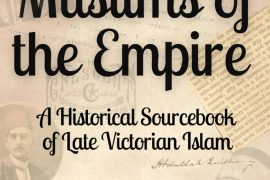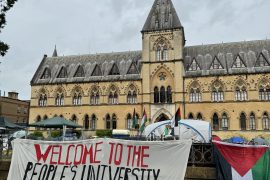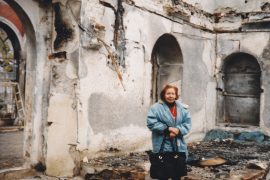Muslims in Britain, 1800‒1970, and Beyond: Historical Approaches & Why
Date: Monday and Tuesday, 1st and 2nd of July, 2024.
Time: Day One – 10 am – 5:30 pm
Day Two – 10 am – 2:30 pm
Venue: Westminster University – Marylebone Campus (see map)
Conference Schedule
Day 1: Monday 1st July
09:30 am – 10:00 am – Arrival, Registration and Refreshments
10:00 am – 10:20 am – Words of Welcome – Westminster & MBRN
10:25 am – 10:45 am – MBRN launches new membership programme & AGM
10:50 am – 11:50 am – First Plenary Session – Abdul-Azim Ahmed
Islam in Wales
Chair: Sariya Cheruvallil-Contractor
11:50 am – 12: 05 pm- Break
12:10 am -1:05 pm – Panel Session 1 (Rooms tbc)
Sufi Communities of Britain: Tracing their Historic Trajectories
Chair: Dr. Hafza Iqbal
- C J (Ted) Bearup (University of Manchester): The Growing Influence of the Shadhiliyya Tariqa in the UK
- Qudra Goodall (University of East Anglia): Intergenerational narratives on belonging, ideology and British Islam
- Farzana Hannan (Trustee of Hijaz Trust) & Imran Khan (Hijaz College): A Very British Islam: The Hijazi Naqshbandi Sufi Community in Warwickshire
Contemporary Trends and Future Possibilities in the Study of British Muslim History
Chair: Dr. Abdul Azim-Ahmed
- Prof. Ron Geaves (Cardiff University): Contestation, Nuance and Consequence in Emic and Etic Approaches in Quilliam Studies
- Prof. Gary R. Bunt (University of Wales, Trinity Saint David) & Prof. Sariya Cheruvallil-Contractor (Coventry University): Future Histories: Our Contemporary Archiving of Digital British Islam
- Tamanna Taznin (Department for Health and Social Care): Is it Fair to say that Muslim Experiences in non-Muslim States are Still Largely Determined by the Legacy of Colonialism?
1:10 pm – 2:10 pm – Networking Lunch
2:15 pm – 3:55 pm – Second Plenary Session
Collaboration and Co-Creation in Documenting History – Community Practitioners and Academia
Chair: Sariya Cheruvallil-Contractor
– Everyday Muslim Heritage and Archive – Insights into community archiving and academic partnership
– Launch of muslimhistorymaps.com
Muslim History Maps is a digital mapping project that collects and shares the history of the global Muslim civilisation, past and present.
– Yahya Birt – Making Community History through Place, Poetry and Performance: the Commemoration of Fatima Cates
– Oluwatosin Daniju – Curating a Photographic Archive
– Asif Shakoor – My story researching BAME seafarers
– Muneera Williams – Spoken Word – Reflections on documenting and archiving family and community history
– Q&A
4:00 pm – 4:15 pm – Break
4:20 pm – 5:25 pm – Panel Session 2 (Rooms tbc)
Muslim Activism and Institutionalisation in British Muslim History
Chair: tbc
- Tabassum Hawa (Royal Holloway, University of London): ‘A History in Shadow’ – Emotions, Identity, and Muslim Activism in Britain: 1933-1953
- Muhammad Nabil (SOAS, University of London): Islamic Charitable and Philanthropic Organisations: Religiosity, Institutional activism and formation of British-Muslim Identities
- Murid Shah Nadiri (University of Oxford): Resurrecting Muslim Intellectual Heritage in London/ A City of Shiʿi Muslim Institutions and Learning
British Muslim Knowledge Production and Resistance in Imperial Britain
Chair: Yahya Birt
- Samuel Bartlett (Royal Holloway, University of London): Renegade in an Imperial Age: Tracing the Subversive Elements of Marmaduke Pickthall’s Scholarship
- Omar Nasr (London School of Economics): British Imperialism, Knowledge Production and Islam in World War II
- Hassam Latif (University of Durham): Lascars and the Pre-History of the Cardiff Race Riots 1919
5:30 pm Close
Day 2: Tuesday 2nd July
09:30 am – 10:00 am – Arrival, Registration and Refreshments
10: 00 am – 10:10 am – Welcome
10:15 am -11:05 am – Plenary (Room tbc)
Muslim Women in Britain, 1850-1950: 100 Years of Hidden History
Chair: tbc
11:10 am – 11:15 am – Coffee Break
11: 20 am – 12:25 pm – Panel Session 4 (Rooms tbc)
History of British Muslim Arts
Chair: tbc
- Hassan Vawda (Goldsmiths University): Muslim Modern Artists in Britain: 1925 and 1962
- Stefan Williamson Fa: Singing Sindhi Saints in Notting Hill: Aziz Balouch and his Sufi Society (1940- 1970)
- Lynsey Haught (University of Birmingham): The Music of the Hemispheres: Halide Edib’s Transnational Voice and the Sound of East-West Fusion in Late Ottoman Constantinople
Travelling To, Through, and Within: History of British Muslim Migration and Travel
Chair: tbc
- Talha Bhamji (University of Wales Trinity Saint David): Recollecting Hijra in the History of Deoband
- Abdul Sabur Kidwai (King’s College London): Islam in/and Victorian Britain: Travel Writing of Sir Syed and Masihuddin Alvi
- Nasima Hassan (Star Academies): 1967: The Journey of a Changemaker
12:30 pm 12:45 pm – Break
12:50 pm – 1:55 pm – Panel Session 4 (Rooms tbc)
Biographical Studies and Methodological Reflections in British Muslim History
Chair: tbc
- Salim Ayduz (Independent Senior Researcher): The Astonishing Story of Ayuba Suleiman Diallo – An African Slave
- Jaffer A. Mirza (King’s College London): Using oral history as a method: Documenting early Shi’a Muslim spaces in Britain (1960s-1970s)
- Iman Dawood (University of Cambridge): A Post-Ideological Islam in the Making? Reflections from Preliminary Fieldwork in the British Muslim Community
Muslimahs in Britain: Injustices, Resistance, and Agency in the Past & Present
Chair: tbc
- Muminah Hussain: Oral History Study into Muslim Female Agency, Late 20th Century Britain
- Muhammad Zubair Abbasi (Oxford Brookes University): Religious Marriage as Children’s Play: Inequality, Uniformity, and Exclusion under English Matrimonial Laws
- Farah Ahmed (University of Cambridge): British Muslim Women Educators’ Innovations to Counter the Securitisation and Demonisation of Muslim Youth.
2 pm – Close
——————————————————-
CALL FOR SUBMISSIONS
Last date for submission of abstracts: Saturday, 11 May 2024
Muslims in Britain, 1800‒1970, and Beyond: Historical Approaches & Why
Venue: University of Westminster
Everyday Muslim Heritage and Archive Initiative (EMHAI) are delighted to announce a collaborative conference between the Muslims in Britain Research Network (MBRN), and the University of Westminster, which will be hosted as part of the Westminster Voices series. This unique partnership aims to bring together scholars, practitioners, and communities to delve into the multifaceted histories of Islam and Muslims in Britain from the 1800s onwards.
Muslims have been in Britain for centuries, but their presence grew in the nineteenth century, as did the first communities. The earliest Muslims had a transient presence in Britain as lascars (sailors), travellers, sojourners, soldiers, servants (including ayahs), students, notables, anti-colonial dissidents, as well as performing troupes including acrobats and ethnographic shows of colonised peoples.
The earliest Muslim communities in Britain evolved around the first mosques in Liverpool and Woking (both 1889) and also in and around the ports of Liverpool, Cardiff, East London, Manchester and South Shields, where from c. 1836 onwards, some ‘lascars’ took local wives and settled down. In the Liverpool and Woking mosque communities, many congregants were converts who encountered Islam through travel, mosque publications or public lectures, as well as sojourners and others who happened to be ‘passing through’. In port communities, working-class women converted to Islam to marry Muslim sailors, set up homes and have families. These conversions took place in social contexts that viewed Islam and Muslims with suspicion and ridicule (Gilham 2014, Ansari 2001). This remained a period of great mobility through imperial networks of sojourners to Britain. Take, for example, the itinerant scholar and thinker Mushir Hosein Kidwai, who stayed in Britain for 15 years over a 23-year timescale, making decisive contributions to the development of early Muslim political organising in Britain during this period, particularly his work on Islam and socialism (Fogg 2019). This conference is interested in uncovering both the transient and settled aspects of the Muslim experience, identity, Islamic beliefs and practices in Britain.
The two world wars saw the substantial contributions of Muslims, a third of the British Indian Army, to the war effort. According to the National Muslim War Memorial Trust, Muslims mainly from the Indian subcontinent (modern India, Pakistan and Bangladesh) and African countries fought on three continents, playing a decisive role in Britain’s first major land victory against Nazi Germany in North Africa. Throughout and beyond this period as Kidwai’s story indicates, Muslims were politically active, engaging in activism around a variety of Muslim issues of national and international significance (Cienkus 2018), including the Armenian-Ottoman conflict, the Khilafat movement and the Indian independence movement (which led to the formation of India, Pakistan and Bangladesh). This conference is keen to explore historical Muslim political activism in Britain.
Post-1960s, mass migration from South Asia, Africa and the Caribbean radically changed the demographics and ‘flavour’ of Islam and Britain forever (Gilliat-Ray 2010). These people from the erstwhile colonies often arrived in the UK, not solely as economic migrants but to help rebuild the mother country, Britain (Weller 2013). This was a new period of history-making, identity formation, and milestone moments. As Muslim communities grew in number and size, they encountered, experienced and challenged racism, anti-Muslim prejudice and Islamophobia (Weller et al 2013). The 1960s and 70s also saw the inception of Muslim institutions – mosques, seminaries, umbrella organisations – that, to date, remain foundational to the identity of Muslims in Britain (Elshayyal 2018, Peace 2015, Fazakarley 2014). Weller writes about the milestone moments in British Muslim history, including the Salman Rushdie affair, which, according to Weller (2009) and Hiro (1992), consolidated Muslim identity in Britain as distinct from South Asian identity. Despite being a period of significant flux and development for Islam in Britain, this period remains unresearched – a gap this conference aims to address.
The histories of Islam in Britain are growing (Ansari 2011, 2008, 2004; Cheruvallil-Contractor 2020, Cheruvallil-Contractor and Gilham 2023, Geaves 2010; Gilham 2023, 2014; Halliday 2010; Lawless 1995; Seddon 2014), but more nuance and granularity is needed about the complexity and intersectionality of Muslim identity and life in Britain, for example around gender, class, ethnicity and different ways of ‘believing’. The available insights provide valuable evidence of how different Muslims and any communities they were part of attempted to, not always successfully, negotiate conciliations between British and Muslim aspects of their identities, values, families, communities and loyalties. Discovering the stories of Islam in Britain has become increasingly important for modern British Muslims who want to better understand their roots in the country and celebrate their histories of activism, agency and nation-building. This conference aims to highlight these histories in all their richness and diversity.
We are eager to include perspectives from various backgrounds and positions, whether academic or non-academic. We encourage individual submissions at any stage of their academic or non-academic career. The goal is to foster collaborative efforts with community stakeholders, promoting knowledge exchange. We very much welcome submissions in different formats, including traditional academic papers, community heritage projects, poetry, spoken word, performances, and other forms of artistic expression. Topics for submissions can include but are not limited to:-
- Intersectionality in historical Muslim identity in Britain
- Post- and de-colonial approaches within history
- Contemporary impact and influence of historical British Muslims
- Experiences of racism and prejudice in early British Muslims
- Histories of Muslim Organizations and Institutions
- Contestations in ‘British Muslim’ identity
- Socio-political activism to date
- Significant ‘British Muslim’ public figures
- Recent books/publications on the history of Islam and Muslims in Britain
To submit a proposal:
- Please submit a title and abstract of no more than 300 words together with names and short biographies (150 words) of the presenter/s, institutional affiliation/s (if relevant), and contact details.
- We also welcome proposals from academics, postgraduate researchers, independent scholars and community practitioners.
- Proposals should be sent to MuslimsinBritainRN@gmail.com
- Deadline: 5 pm on Friday, 11th May 2024
- Successful presenters will be notified by 24th May 2024
Conference Organisers
Sadiya Ahmed, Samuel Bartlett, Sariya Cheruvallil-Contractor
Muslim in Britain Research Network, Everyday Muslim Heritage and Archive Initiative and University of Westminster




Comments are closed.